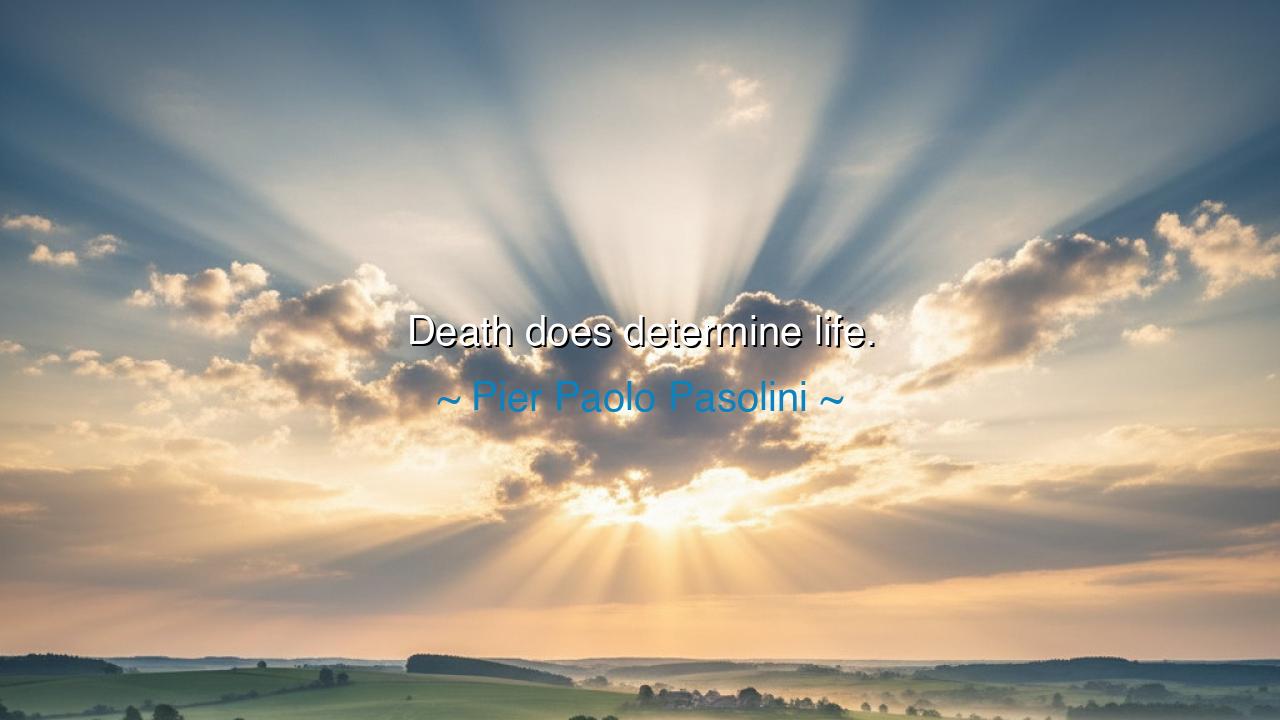
Death does determine life.






“Death does determine life.” These four words, spoken by Pier Paolo Pasolini, poet, filmmaker, and martyr of thought, fall like ancient prophecy. In their brevity lies an abyss of meaning. To the unthinking ear, they may sound somber, fatalistic — but to the wise, they reveal a deep and trembling truth: that it is death, not life, which gives life its shape, its measure, and its final meaning. For as Pasolini saw, no story is complete until its end is written. Life, with all its chaos and contradiction, becomes clear only when it is closed by death — the ultimate punctuation to the sentence of existence.
The origin of this quote lies in the philosophical and artistic reflections of Pasolini himself — a man whose life was as intense as his art. Born in Italy amidst the turmoil of war and transformation, he lived fiercely, unafraid to confront hypocrisy, power, and moral decay. For Pasolini, life was not a fixed state but an unfolding narrative — one that only death could finalize. Until that moment, a human being remains unfinished, like a poem without its final stanza. He believed that only through death can one’s story be seen in full — only then can the scattered fragments of life, its contradictions and choices, be gathered into a single meaning. In this way, death determines life, for it is the lens through which all that came before is finally understood.
The ancients knew this truth well. The Greeks carved it into their tragedies, where heroes — from Achilles to Oedipus — were judged not by their birth, but by the manner of their end. Achilles’ glory was not in his strength, but in the way he embraced his fated death for honor’s sake. Oedipus, broken and blind, achieved wisdom only at the end of his suffering. So too did the philosophers of Rome speak of death as the final sculptor of character. Seneca wrote, “It is not how long we live, but how we die, that shows what we are.” For when the body is stilled, the spirit’s pattern becomes visible. Life’s meaning, hidden amid its confusion, emerges only when viewed from beyond its end.
Pasolini himself lived this truth with prophetic intensity. His life was full of brilliance and rebellion — a voice for the poor, the silenced, and the despised. Yet it was his death, violent and mysterious, that cast his life in its final light. When he was murdered in 1975, the world suddenly saw the full measure of his defiance and courage. The artist who had once been condemned and mocked was, in death, recognized as a visionary. His murder transformed his life into testament — the proof that truth-telling often exacts its price in blood. Thus, his own death became the very fulfillment of his belief: it determined the meaning of his life, revealing what his art and courage had truly stood for.
“Death does determine life” is therefore not a statement of despair, but of completion. It reminds us that to live is to be writing one’s epitaph with every action, every word, every silence. Each day adds a line, and one day, the hand will stop — and only then will the full text be read. This awareness should not fill us with dread, but with purpose. For if death gives life its meaning, then it is within our power to make that meaning noble. Knowing that the end awaits us all, we must live in such a way that our death — when it comes — will not erase us, but reveal us.
Consider Socrates, who met death with calm and conviction, drinking the hemlock rather than betraying truth. His death determined his life; it sealed his teaching with immortality. Had he fled or begged for mercy, his words might have faded into the dust of time. But in dying for what he believed, he transformed his philosophy into eternal example. Death, far from destroying him, gave him the power to speak to every age that followed. This is the paradox of Pasolini’s wisdom: what seems an ending is, in truth, the moment of revelation — when the soul’s true face is shown.
The lesson, then, is clear: live with the end in mind, not in fear of it, but in reverence for it. Do not drift through the days as if they were endless, for they are numbered, and their sum is your story. Ask yourself, “If I were to die today, what would my life say?” Let that question guide your choices. Live truthfully, love fiercely, create bravely, forgive deeply — for all these become the lines that death will one day bind into meaning.
So, remember the teaching of Pier Paolo Pasolini: death determines life. Not by cruelty, but by truth. It is the silent mirror in which the soul’s reflection is at last made whole. To live well, then, is to prepare for that reflection — to fill the days not with noise, but with purpose, not with fear, but with beauty. And when death comes, as it must to all, may it find you not surprised, but ready — your story complete, your spirit radiant, your life, at last, fully understood.






AAdministratorAdministrator
Welcome, honored guests. Please leave a comment, we will respond soon